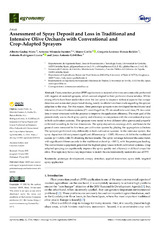Assessment of Spray Deposit and Loss in Traditional and Intensive Olive Orchards with Conventional and Crop-Adapted Sprayers

View/
Author
Godoy-Nieto, Alberto
Miranda Fuentes, Antonio
Grella, Marco
Blanco Roldán, Gregorio L.
Rodríguez Lizana, Antonio
Gil Ribes, Jesús
Publisher
MDPIDate
2022Subject
Prototype developmentCanopy detection
Applied innovation
Spray drift
Targeted spray application
METS:
Mostrar el registro METSPREMIS:
Mostrar el registro PREMISMetadata
Show full item recordAbstract
Plant protection product (PPP) applications to isolated olive trees are commonly performed with regular air-assisted sprayers, which are not adapted to their particular characteristics. Whilst strong efforts have been undertaken over the last years to improve technical aspects like canopy detection and automated proportional dosing, nearly no efforts have been made regarding the sprayer adaption to the crop. For this reason, three prototype sprayers were developed for traditional and intensive olive cultivations systems (P1: centrifugal fan; P2: six small side axial fans; P3: two axial fans in tower structure) with the purpose to improve the application efficiency. The main goal of the present study was to check spray quality and efficiency in comparison with the conventional sprayer in both cultivation systems. The sprayers were tested in two different olive groves and properly calibrated according to the tree dimensions. The spray deposition, coverage, drift, and losses to the ground were measured in five trees per cultivation system by placing the appropriate collectors. The sprayers performed very differently in both cultivation systems. In the intensive system, the spray deposition did not present significant differences (p = 0.105). However, it did in the traditional system (p = 0.003), with P3 obtaining the best results. The spray coverage followed the same trend, with significant differences only in the traditional orchard (p = 0.011), with the prototypes leading. The conventional equipment generated the highest spray losses in both cultivation systems. Crop adapted spraying can significantly improve the spray quality and efficiency in difficult crops like olive. This topic may have a key importance to match the environmentally sustainable use of PPP.
